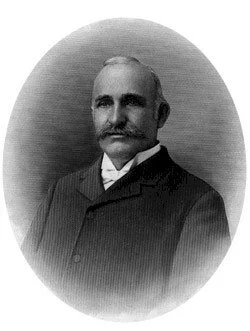RWB Joel Poinsett
Joel Poinsett was a true Renaissance man. He was an expert in agriculture and horticulture, a diplomat, a legislator, a Congressman, a Secretary of War, an advisor to the Czar, the founder of The Smithsonian Institution, an active member of our Fraternity, and a lover of our American Union. His influence on our nation during the first half of the Nineteenth Century has been of lasting importance. He is recorded as being a past master of both Recovery Lodge, No. 31, Greenville, and of Solomon's Lodge, No. 1, in Charleston. In 1821, he was also elected Deputy Grand Master of the Grand Lodge of South Carolina.
GOVERNOR WB MARTIN FREDRICK ANSEL
Born in Charleston, South Carolina, of German descent, Martin grew up in Walhalla. He was admitted to the bar in 1870, first practicing law in Franklin, North Carolina, then in Greenville, South Carolina, where he became involved in politics. He served in the state legislature between 1882 and 1888 as a Representative, then was elected solicitor in the eighth Judicial Circuit, where he stayed until 1901. He explored a run for governor in 1902, but did not actually run until 1906 when he was elected with 100% of the vote after winning a Democratic runoff. He was re-elected in 1908 after a decisive primary win and running unopposed in the final election. During his terms, statewide prohibition was established, the state Audubon Society was charted, high schools were placed under state supervision, a State Health Office was established, and the State Insurance Department was organized. After leaving office he returned to Greenville and his private law practice.
He was Past Master of Recovery Lodge No. 31 in 1888.
Major Rudolf Anderson
Rudolf Anderson was raised in Greenville and attended Greenville High. An Eagle Scout, he spent summers at Camp Old Indian. At Clemson University he joined Air Force ROTC and earned a degree in Textile Engineering. After college he served in the Air Force Reserve and took a job as a cost accountant at Dunean Mills in Greenville. He was active in his church and community, and was a Freemason and member of Recovery Lodge No. 31. When the Korean war began he was placed on active duty and heroically flew reconnaissance missions in the F-86, twice earning the Distinguished Flying Cross. Later during the Cuban missile crisis of 1962, a U-2 mission showed the Soviets were placing medium-range nuclear missiles in Cuba. Over the next several days, additional missions were flown including one by then Major Rudolf Anderson. After one pilot narrowly escaped a Soviet surface-to-air missile, the U-2 flights were cancelled. Major Anderson objected to the cancellation and convinced his superiors to allow him to fly one more mission. His U-2 was shot down and he perished earning him posthumously the Distinguished Service Medal. Consensus among military historians is that if not for Anderson's sacrifice, the confrontation would have escalated to nuclear war and that millions might have died.
WB Jacob W. Cagle
Jacob Cagle was born in North Carolina and moved to Greenville in 1853. He was a hero of the South and served with distinction as captain of the famed Butler Guards. After the war, he built a construction empire in Greenville and served multiple times as Master of Recovery Lodge. Upon his death in 1910, his family donated the beautiful marble altar, before which, every mason of Recovery Lodge has since been obligated.
He was Past Master of Recovery Lodge in 1873, 1874, 1878, 1879.




